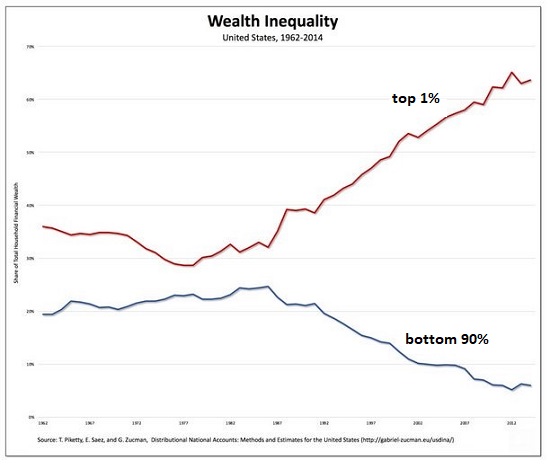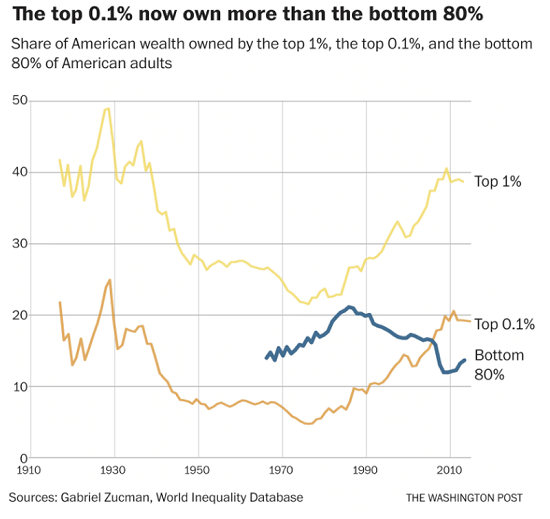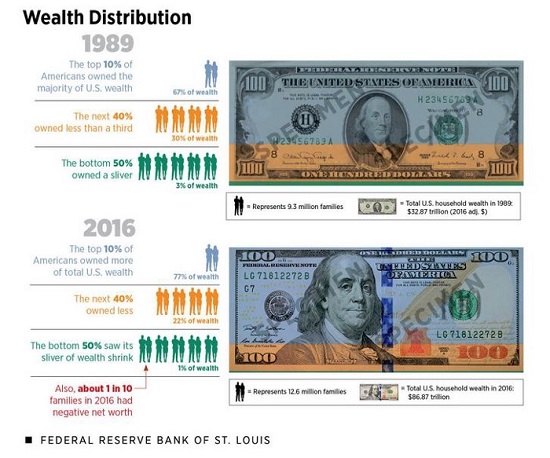
What does it state about our “success” if we can’t even afford to equal the buying power of the minimum wage paid 50 years earlier? It says the 1% got the mine and the bottom 90% got the shaft.
Given the rising prosperity we keep hearing about, shouldn’t we be able to offer base pay workers the same purchasing power they delighted in 50 years earlier in 1970? This is a really basic proposition: either can offer base pay workers the very same purchasing power they took pleasure in 50 years ago or we can’t, and if we can’t, then all the claims about “increasing success” are exposed as false.
Given that I was a base pay earner in 1970 at age 16, I have first-hand experience of the purchasing power of minimum salaries in the 1970-1974 age. Let’s keep it easy: how many hours of minimum wage labor did it require to purchase a new economy automobile, a brand-new home and lease a studio home in among the most expensive cities in the U.S.?
To keep it simple, let’s set aside taxes and simply use the standard base pay, not the net wage.
Never ever mind all the expensive analytical footwork of hedonics, replacement and weighting that are released to arbitrarily reduce the rate of consumer price inflation. In the real world, wage earners bought whatever vehicles and homes were offered at the time, and leased whatever homes were available at the time.
The only precise way to measure the buying power of labor is to ask: how many hours of labor did it require to pay the rent, purchase a new vehicle or buy a new house? Any other procedure is simply sleight of hand meant to obscure the collapse of earnings’ buying power.
In 1970, I made $1.65 an hour. A new economy cars and truck (Ford Maverick or VW beetle) was $2,000, so it took about 1,200 hours of work to buy a new economy cars and truck.
A new home cost typically about $26,000 in 1970, so it took 15,750 hours of base pay labor to buy a new house.
At today’s federal base pay of $7.25/ hour, it takes 3,000 hours to purchase a fundamental 2021 Honda Civic or comparable which costs $22,000. To purchase a brand-new economy cars and truck today with 1,200 hours of base pay labor, the minimum wage would need to be $18.30/ hour: 1,200 time $18.30 = $21,960.
At today’s federal base pay of $7.25/ hour, it takes 56,000 hours to buy the typical priced home which now costs $408,000. Let’s state there are houses readily available for $300,000, so it takes 41,380 hours of minimum wage labor to buy a house.
To purchase a new house for $408,000 with 15,750 hours of labor, the wage would require to be $25.90/ hour. To purchase a $300,000 home with 15,750 hours of labor, the wage would require to be $19/hour.
Moving on a couple of years to 1974, the base pay increased to $2/hour, and I rented a small studio home in Honolulu, one of the most costly cities in the U.S. for $120/month. Therefore it took 60 hours of minimum wage labor to pay the rent.
Studio apartments in Honolulu are now around $1,100/ month lease, so to pay the rent with 60 hours of minimum wage labor, the base pay would require to be $18.30/ hour.
In 1974, I paid $89.25 in tuition and $27 student fees per semester to go to the University of Hawaii at Manoa. (These numbers stick in your head when you’re spending for them in money made at low-paying tasks while you’re bring a full five courses a term.) That’s $233 per year. At a wage of $2/hour, it took 116 hours of labor to pay the annual tuition and costs.
The existing expense of tuition and fees at the University of Hawaii at Manoa is $12,186 per year. To pay the tuition and charges with 116 hours of work, the hourly wage would need to be $105/hour. If America gets any more “flourishing,” I will not understand whether to puke or go blind.
To equal the buying power of minimum incomes in 1970-1074, the minimum wage would need to be at least $18/hour. Anything less does not equivalent the purchasing power of the base pay paid 50 years earlier, and no amount of statistical hoax can eliminate this reality.
What does it say about our “prosperity” if we can’t even pay for to equate to the buying power of the base pay paid 50 years earlier? It says the 1% got the mine and the bottom 90% got the shaft.



sources: https://www.dol.gov/agencies/whd/minimum-wage/history/chart!.?.!https://www.bls.gov/data/inflation_calculator.htm!.?.!http://www.1970sflashback.com/1970/economy.asp!.?.!http://www.thepeoplehistory.com/70scars.html!.?.!https://www.statista.com/statistics/240991/average-sales-prices-of-new-homes-sold-in-the-us/https://files.eric.ed.gov/fulltext/ED086037.pdf If you discovered value in this content
, please join me in looking for services by ending up being a$1/month client of my work by means of patreon.com. My brand-new book is offered! A Hacker’s Teleology: Sharing the Wealth of Our Diminishing World 20%and 15%discount rates(Kindle$7, print$17, audiobook now readily available$17.46)Read excerpts of the book totally free(PDF). The Story Behind the Book and the Intro. Recent Podcasts: Charles Hugh Smith on the Age of Accelerating Expropriations(38 minutes )(FRA Roundtable Insight)Covid Has Activated The Next Great Financial Crisis
(34:46 )My COVID-19 Pandemic Posts My current books: A Hacker’s Teleology: Sharing the Wealth of Our Shrinking World( Kindle $8.95, print$20, audiobook $17.46)
Check out the first section totally free(
PDF ). Will You Be Richer or Poorer?: Revenue, Power, and AI in
a Distressed World(
Preventing the Final Fall of Our Democratic Republic ($5(Kindle),
$10 (print), (audiobook): Check out the first section
totally free(PDF). The
Adventures of the Consulting Theorist: The Disappearance of Drake$1.29 (Kindle ), $8.95 (print) ; checked out the first chapters totally free (PDF)Cash
personal and will not be provided to any other individual, company or company. Thank you, Robert H. ( $50), for your marvelously generous contribution tothis site–

